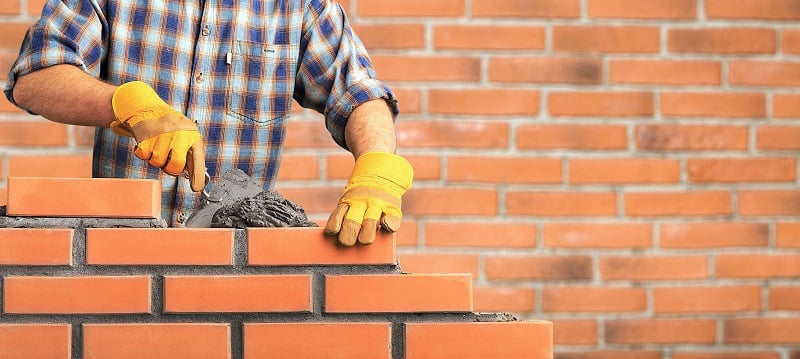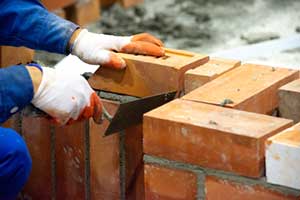Unlocking the Tricks of Lasting Stonework Construction Practices for Eco-Friendly Structures
Amongst the myriad methods to environmentally friendly structure, sustainable stonework building and construction stands out as a tried and true and resilient method that holds a wide range of untapped potential. From the choice of materials to ingenious construction strategies, the tricks to accomplishing sustainability within masonry construction are diverse and appealing.
Benefits of Lasting Masonry Construction
Welcoming lasting masonry building practices not just decreases environmental impact but also supplies long-lasting economic advantages to building contractors and neighborhoods. By making use of materials like recycled bricks, blocks, and stones, home builders can substantially decrease the carbon footprint of their jobs while advertising resource effectiveness. In addition, sustainable masonry construction methods, such as correct insulation and thermal mass residential or commercial properties, can enhance energy efficiency within structures, leading to reduced operational prices in time.
Additionally, the toughness and strength of stonework structures add to lasting financial benefits. Buildings constructed utilizing sustainable masonry practices often call for less repair and maintenance, translating to set you back financial savings for contractors and homeowner. The durability of stonework products additionally makes sure that frameworks remain steady and safe, minimizing the demand for frequent improvements or substitutes.
Eco-Friendly Stonework Products
Utilizing environmentally friendly masonry products is a crucial step in the direction of improving the sustainability of construction techniques and lessening environmental influence while taking full advantage of long-term economic advantages. Sustainable masonry products are sourced, generated, and made use of in a manner that reduces total ecological impact. Sustainable concrete obstructs include recycled aggregates and might include improved insulation properties, contributing to power effectiveness in structures.
In addition, natural products like adobe, rammed planet, and straw bales offer superb thermal mass buildings, minimizing the demand for heating and cooling power. These materials are usually locally available, promoting local economic situations and lowering transportation-related carbon exhausts. By picking eco-friendly stonework products, building tasks can significantly reduce their ecological footprint and contribute to the development of healthier, more lasting constructed settings.
Energy-Efficient Masonry Strategies
Power effectiveness plays a crucial function in boosting the sustainability of stonework building and construction practices. One crucial energy-efficient masonry strategy is the usage of Clicking Here thermal mass, which entails integrating dense materials like concrete or block right into the building's structure to soak up and store heat.

Advancements in Sustainable Stonework
Current improvements in sustainable masonry practices have produced ingenious methods that are reshaping the building industry. One such advancement is the development of self-healing concrete, which uses germs embedded within the concrete to heal splits autonomously. This innovation not only decreases upkeep costs but likewise improves the sturdiness of stonework frameworks, adding to their sustainability.
One more noteworthy advancement is making use of recycled accumulations in stonework building - masonry contractor. By incorporating materials such as smashed ceramic waste or recycled glass right into concrete mixes, building contractors can reduce the environmental impact of construction jobs while maintaining structural integrity. This method not just draws away waste from land fills yet also conserves all-natural resources, making it an essential innovation in lasting masonry building
Additionally, the integration of electronic style devices, such as Structure Information Modeling (BIM), is revolutionizing the way stonework frameworks are intended and created. BIM enables more specific calculations, reduced material waste, and enhanced energy effectiveness, inevitably bring about even more lasting structure practices. These advancements collectively signify an encouraging future for lasting stonework construction in the era of eco-friendly structures.
Future Trends in Masonry Sustainability
With the cutting-edge strides made in lasting concrete floor designs stonework techniques, the future fads in masonry sustainability are poised to more view it revolutionize the building and construction market. One of the key patterns shaping the future of stonework sustainability is the enhanced integration of modern technology. Innovations such as Building Details Modeling (BIM) and online fact simulations are being utilized to enhance masonry building and construction procedures, resulting in reduced product waste and enhanced power performance in buildings.
Furthermore, the growth of novel sustainable materials is readied to play a considerable role in boosting the eco-friendliness of stonework building. masonry contractor. Advancements like self-healing concrete, recycled aggregates, and bio-based binders are obtaining traction for their capability to lessen ecological influence while keeping structural honesty

Verdict
To conclude, lasting stonework building and construction methods supply numerous benefits for eco-friendly structures. By making use of environment-friendly materials and energy-efficient techniques, masonry can contribute to a much more lasting constructed atmosphere. Innovations in sustainable stonework are continuously being established to better boost the ecological efficiency of buildings. Looking in the direction of the future, the trend of stonework sustainability is expected to expand, leading to more eco-friendly and energy-efficient building and construction practices in the years ahead.